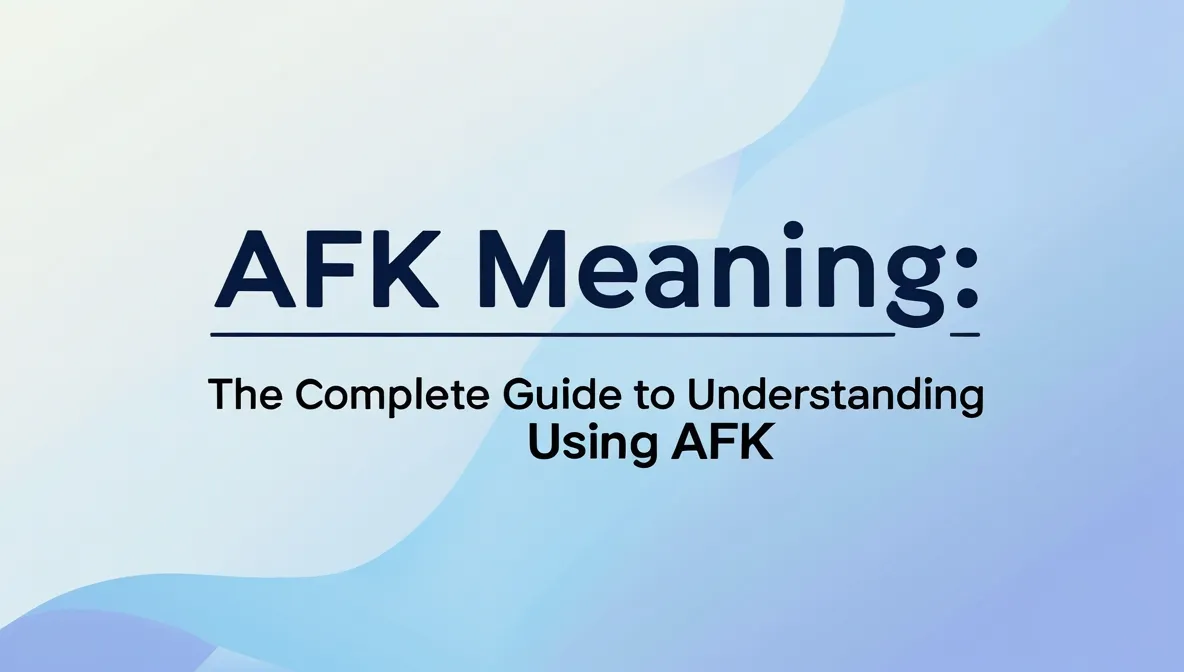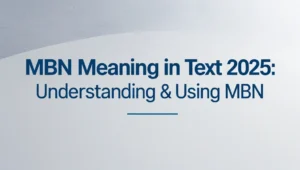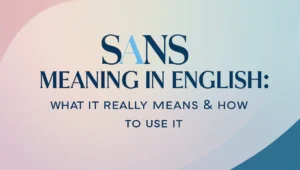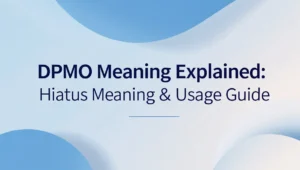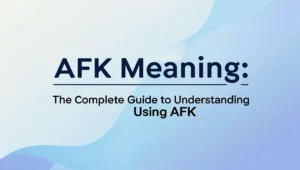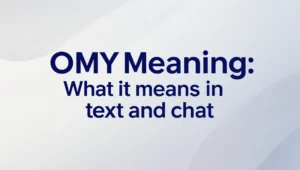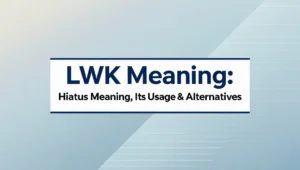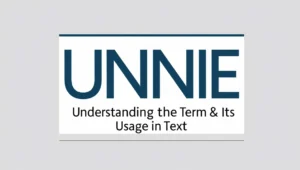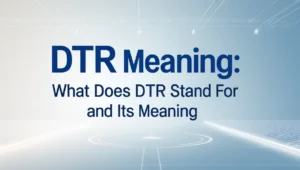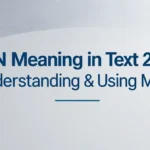In the world of digital communication and gaming, abbreviations and short forms have become part of our everyday language. One of the most widely used is AFK, which stands for Away From Keyboard. The AFK meaning is simple but powerful—it tells others that you are temporarily unavailable without having to explain in detail. From online gaming platforms to casual texting and professional work chats, this little acronym has found a permanent place in internet culture. Understanding the complete guide to AFK not only helps you communicate better but also ensures you’re always in sync with the fast-changing world of online conversations.
What Does AFK Mean?
AFK literally translates to Away From Keyboard. It is an abbreviation used to let others know that you are not currently active or present on your device. While keyboards were the original focus, today AFK is used across mobile texting, gaming, and work chats even when no physical keyboard is involved.
People often say things like:
- “AFK for 5 mins.”
- “Dinner time, AFK.”
- “AFK until tomorrow.”
This shows that AFK is flexible and works in both formal and informal settings depending on the context.
The Origin of AFK
The phrase Away From Keyboard first became popular during the early days of multiplayer gaming and online chatrooms. In the 1990s, gamers needed a quick and polite way to let teammates know that they were stepping away without logging out. Over time, AFK spread from gaming communities to social media, texting, and even workplace chat tools like Slack and Teams.
The fact that AFK has survived decades of technological change shows how deeply it is rooted in digital culture.
AFK in Online Gaming
Gaming is where AFK usage truly shines. For players, typing AFK is a quick way to avoid confusion during matches. Here’s how it’s typically used:
- A teammate might type “AFK, back in 2 mins” to avoid being kicked from the lobby.
- Some games penalize players for staying AFK too long because it can hurt team balance.
- In certain games, terms like AFK farming or AFK botting are used when players leave their characters running automatically to collect resources.
In competitive games, staying AFK can frustrate teammates, so using it properly shows respect and responsibility.
AFK in Texting and Everyday Chat
Outside gaming, AFK meaning in texting is just as common. People use it in group chats, personal messages, and even social media. Examples include:
- “AFK, grabbing coffee.”
- “Busy at work, AFK.”
- “AFK but I’ll reply later.”
Unlike other abbreviations, AFK strikes a balance between informality and politeness, making it useful across different types of conversations.
AFK in Professional Communication
While AFK started in gaming, it has gradually entered work-from-home culture. In professional chat tools, you might see messages like:
- “AFK until 3 PM, in a client meeting.”
- “AFK for lunch, back in 20 mins.”
However, in formal emails or customer-facing communication, using phrases like “Out of Office” or “Stepping Away” is more appropriate. This shows that context matters when choosing whether to use AFK or its alternatives.
AFK vs. BRB vs. GTG
AFK is often confused with similar abbreviations like BRB (Be Right Back) or GTG (Got To Go). The differences are subtle but important:
- AFK – Temporary absence, no fixed time given.
- BRB – Short-term absence with an intention to return quickly.
- GTG – Immediate exit, usually not returning soon.
Understanding these differences helps in clearer digital communication and prevents misunderstandings.
AFK in Social Media and Memes
The AFK abbreviation has gone beyond serious conversations. It is now widely used in memes, jokes, and internet humor. Examples include memes like:
- “When your teammate goes AFK during the final round.”
- “Me: I’ll just be AFK for a minute. Also me: disappears for 2 hours.”
This fun and creative use of AFK has kept the term relevant and trendy, especially among younger audiences.
Common Misunderstandings About AFK
Some people assume AFK only belongs to gaming circles, but in reality, it is a universal digital term. Others misinterpret AFK as meaning permanently unavailable, but that’s not true—it always implies a temporary absence. Knowing this helps avoid confusion in group chats or professional spaces.
Why AFK is Still Popular in 2025
Even though we now use smartphones more than keyboards, AFK has not lost its charm. Its simplicity, global recognition, and quick typing convenience make it a phrase that works across platforms. Whether you are chatting on WhatsApp, gaming on PC, or attending a remote meeting, AFK is still understood instantly.
AFK vs. Idle vs. Offline
Though often used interchangeably, these terms have small but important differences:
- AFK – You’re away for a short time but might come back soon.
- Idle – You’re inactive, but still technically present.
- Offline – You’re completely disconnected and not available at all.
This distinction is especially important in gaming and work platforms where presence indicators matter.
Polite Alternatives to AFK
Sometimes, AFK might feel too casual depending on the audience. In those cases, alternatives work better:
- Be Right Back (BRB) – Great for casual chats.
- Stepping Away – More professional.
- Out of Office (OOO) – Perfect for workplace emails.
- Unavailable – Simple and formal.
Choosing the right phrase depends on whether you are speaking with friends, colleagues, or clients.
AFK in Remote Work Culture
As remote work becomes more common, AFK is being used in workplace chats alongside emojis and status updates. A typical message might look like:
- “AFK – picking up kids from school.”
- “AFK for 30 mins, will reply after lunch.”
This makes digital collaboration smoother and helps teams stay updated about availability.
How to Respond When Someone Says AFK
When someone types AFK, the polite thing to do is acknowledge it. Responses can include:
- “No worries, take your time.”
- “Got it, I’ll wait.”
- “Okay, see you soon.”
These replies show understanding and courtesy, which keeps online communication friendly.
The Future of AFK in Online Communication
Language evolves quickly, but AFK has managed to survive multiple waves of internet slang. Its practicality and short form ensure it will continue to be relevant in gaming, texting, and remote work. As digital spaces grow, AFK is likely to remain part of everyday online vocabulary.
Conclusion
The AFK meaning may be simple, but its impact on online communication is significant. From gaming strategies to professional chats, AFK is a quick and polite way to say you’re unavailable. Knowing how and when to use it makes conversations smoother, prevents misunderstandings, and shows respect for others’ time. In a world where being connected matters, AFK gives us a way to step away without breaking the flow of communication.
FAQs
1. What does AFK stand for in chat? AFK stands for Away From Keyboard, meaning someone is temporarily unavailable.
2. Is AFK only used in gaming? No, AFK is used in gaming, texting, workplace chats, and social media.
3. Can I use AFK in professional settings? Yes, but in very casual work chats. For formal emails, phrases like Out of Office are better.
4. What’s the difference between AFK and BRB? AFK means away without specifying time, while BRB suggests a quick return.5. Will AFK still be used in the future? Yes, AFK has become a universal internet term and will continue to be widely understood.

